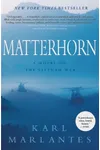Picture a storyteller who turned the chaos of war into gripping, soul-stirring tales—meet Karl Marlantes! Born in 1944 in a small Oregon logging town, this decorated Vietnam War veteran transformed his battlefield experiences into literary masterpieces. His debut novel, Matterhorn, and reflective non-fiction, What It Is Like to Go to War, have cemented his place as a profound voice on the human cost of conflict.
Marlantes’s journey from Marine lieutenant to celebrated author is as compelling as his books. With a light yet unflinching tone, he invites readers to confront the raw realities of war and the resilience of the human spirit. Ready to dive into his world?
The Making of Karl Marlantes
Karl Arthur Marlantes grew up in Seaside, Oregon, where the rugged Pacific Northwest shaped his early years. The son of a school principal, he excelled as a student, earning a National Merit Scholarship and a spot at Yale University. At Yale, he played rugby and joined the Marine Corps Platoon Leaders Class, setting the stage for his military service. Awarded a Rhodes Scholarship to Oxford, Marlantes paused his studies to serve in Vietnam, a decision that would define his life and work. After earning his master’s degree, he carried the weight of his experiences into a decades-long writing journey.
Karl Marlantes’s Unforgettable Stories
Marlantes’s debut, Matterhorn: A Novel of the Vietnam War (2010), is a towering achievement. This semi-autobiographical epic follows Lieutenant Waino Mellas and his Marine platoon through the brutal jungles of Vietnam. Critics, including Sebastian Junger, hailed it as one of the most devastating war novels ever, praising its vivid battle scenes and unflinching look at camaraderie and loss. It won the 2011 Washington State Book Award and became a New York Times bestseller.
His follow-up, What It Is Like to Go to War (2011), is a non-fiction meditation on the psychological and spiritual toll of combat. Marlantes draws from his own struggles with post-traumatic stress, offering raw insights into guilt, survival, and reintegration. His later novels, Deep River (2019) and Cold Victory (2024), explore Finnish-American immigrants and Cold War tensions, showcasing his versatility. Marlantes’s style—gritty, introspective, and richly detailed—blends visceral action with profound moral questions, making his work both thrilling and thought-provoking.
Why Karl Marlantes Matters
Marlantes’s impact lies in his ability to humanize war’s complexities. His books bridge the gap between veterans and civilians, fostering empathy for those haunted by combat. Featured in PBS documentaries and praised by literary giants, he has reshaped how we understand Vietnam and its lasting echoes. By confronting trauma with honesty, Marlantes inspires readers to reflect on courage, sacrifice, and healing, ensuring his stories resonate far beyond the page.
- Born: December 24, 1944, Seaside, Oregon
- Key Works: Matterhorn, What It Is Like to Go to War, Deep River, Cold Victory
- Awards: Navy Cross, Bronze Star, two Purple Hearts, 2011 Washington State Book Award
- Fun Fact: He spent 30 years crafting Matterhorn, cutting it from 1,600 to 600 pages!
Snag Matterhorn or What It Is Like to Go to War and dive into Karl Marlantes’s gripping, heartfelt world of war and redemption!



